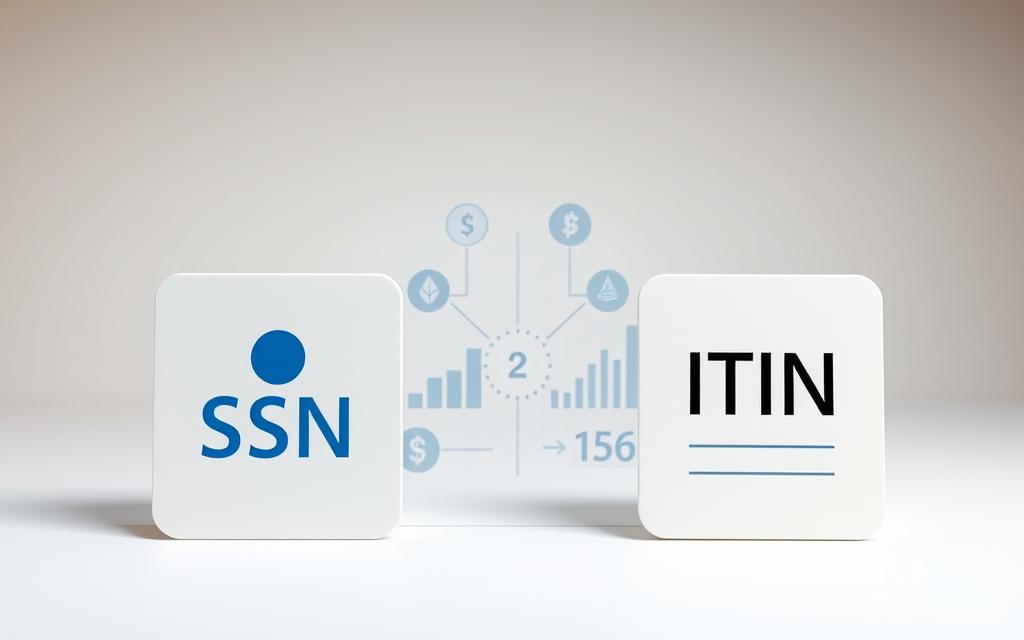Table of Contents
Cryptocurrency has gained massive popularity, attracting many international scholars studying in the U.S. With the market exceeding $3.2 trillion, digital assets present a tempting opportunity. But what about those holding an F-1 visa?
Yes, visa holders may participate in crypto trading. However, strict IRS rules apply. Nonresidents must report earnings to avoid penalties. Tax compliance is critical for maintaining legal status.
This guide covers essential details. Learn about permitted activities, tax obligations, and secure platforms. Staying informed ensures smooth financial growth without risking visa violations.
Understanding the Legality of Crypto Investments for F-1 Students
Passive income streams, like cryptocurrency, offer unique financial flexibility for visa holders. However, F-1 scholars must distinguish between permitted investments and unauthorized work to maintain legal status.
F-1 Visa Restrictions and Passive Income
U.S. immigration law prohibits off-campus employment without authorization. Yet, passive income—earned through assets rather than labor—is allowed. The IRS classifies crypto as property, meaning profits from sales qualify under this category.
Example: Buying Bitcoin and selling it later for profit generates capital gains, not employment income. This distinction is critical for avoiding visa violations.
Cryptocurrency vs. Traditional Employment
Unlike part-time jobs requiring CPT/OPT approval, crypto trading doesn’t involve an employer. IRS Notice 2014-21 clarifies that digital assets are taxed similarly to stocks. However, frequent trading could trigger scrutiny.
“Misclassifying crypto activities as ‘employment’ risks violating visa terms. Passive investing remains the safer approach.”
For clarity, compare crypto to the stock market. Both are investment vehicles, but only traditional jobs need explicit work authorization.
Tax Implications for F-1 Students Investing in Crypto
Navigating tax obligations for digital assets requires careful attention from international scholars. The U.S. treats cryptocurrency as property, meaning every trade or sale triggers reporting requirements. Missteps risk penalties or visa complications.

How the IRS Treats Cryptocurrency
The IRS classifies crypto as property, similar to stocks or real estate. Taxable events include selling, trading, or spending digital assets. Even converting Bitcoin to Ethereum counts as a sale.
Example: Purchasing Ethereum at $2,000 and selling at $3,000 creates a $1,000 taxable gain. Records must show the cost basis and sale price.
Capital Gains Tax for Nonresident Aliens
Nonresidents face a flat 30% rate on capital gains. Unlike U.S. citizens, losses can’t offset future profits. Short-term holdings (under one year) lack preferential rates.
“F-1 visa holders must file Form 1040-NR for crypto earnings, even if no tax is owed.”
Reporting Crypto Profits on Form 1040-NR
Use Form 1040-NR with Schedule NEC to declare earnings. Include:
- Transaction dates and amounts.
- Fair market value at time of sale.
- Calculated gains or losses.
Late filings may incur fines or visa scrutiny. Accurate records prevent audits.
How to Calculate and Pay Taxes on Crypto Gains
Accurate tax reporting for cryptocurrency gains is critical for maintaining compliance as an international investor. Miscalculations risk audits or visa complications. Follow these steps to ensure proper filings.
Determining Cost Basis and Fair Market Value
The cost basis is the original purchase price plus transaction fees. For example, buying 1 ETH for $2,500 with a $10 fee sets a basis of $2,510. The IRS requires reporting this number to assess taxable profits.
Fair market value (FMV) is the asset’s price when sold or traded. If the ETH later sells for $3,000, the capital gain is $490 ($3,000 – $2,510). Record dates and values for every transaction.
Using FIFO vs. Specific Identification Methods
The IRS defaults to FIFO (first-in-first-out) if no method is specified. This means the oldest assets are sold first, which may increase gains in rising markets.
Alternative: Specific identification lets you choose which assets to sell, optimizing tax outcomes. For instance, Sachin, an F-1 investor, reduced his 2022 tax bill by selling higher-cost Bitcoin lots first.
“FIFO is automatic, but specific ID requires detailed records. Both methods must be applied consistently.”
Automated tools like Koinly or CoinLedger simplify tracking. They sync with exchanges, calculate gains, and generate IRS-ready reports. This minimizes errors and saves time during tax season.
- Key steps: Track every buy/sell, label lots, and export transaction histories.
- Avoid penalties: File Form 1040-NR even if no tax is owed.
Essential Tools for Tracking Crypto Investments
Managing digital assets efficiently requires specialized tools for tracking transactions and tax compliance. Automated solutions reduce errors and save time during filings. Visa holders must prioritize accuracy to avoid legal risks.
![]()
Koinly and Tax Software Solutions
Koinly aggregates data from exchanges like Coinbase and Binance. It auto-imports trades, calculates gains, and generates IRS-ready reports. This eliminates manual entry errors.
“Tax software bridges the gap between complex crypto activities and IRS compliance.”
Compare top platforms:
| Platform | Key Feature | Best For |
|---|---|---|
| Koinly | Multi-exchange sync | Active traders |
| TurboTax Crypto | Integration with tax filings | Beginners |
| CoinTracker | Portfolio tracking | Long-term holders |
Maintaining Records for IRS Compliance
The IRS mandates detailed logs for every transaction. Essential records include:
- Dates and amounts of buys/sells.
- Counterparty details (if peer-to-peer).
- Fair market values at transaction time.
Hardware wallets like Ledger provide immutable logs. Never rely solely on exchange-generated 1099-K forms—they often omit key information.
Choosing the Right Crypto Exchange as an F-1 Student
Selecting a reliable exchange is crucial for visa holders to ensure compliance and security. Not all platforms accommodate international scholars, so verifying ITIN/SSN support is essential. Prioritize user-friendly interfaces and robust tax reporting tools.

Top Platforms Accepting SSN/ITIN
Leading exchanges like Coinbase, Binance, and Kraken support ITIN-based accounts. These platforms simplify onboarding for nonresidents. Fidelity and TD Ameritrade also allow ITIN registrations for crypto-linked investments.
“ITIN-friendly exchanges reduce paperwork hurdles, letting scholars focus on strategic trades.”
Comparing Fees and Security Features
Fee structures vary significantly. Coinbase charges a 1.49% spread, while Binance offers 0.1% spot fees. Weigh costs against features like:
- Two-factor authentication (2FA) for login security.
- Cold storage for asset protection.
- Insurance funds against breaches.
Example: Beginners may prefer Coinbase’s intuitive design, despite higher fees. Advanced traders often opt for Binance’s low-cost model.
Geographic restrictions apply. Using VPNs to bypass location limits violates terms of service. Stick to platforms legally operating in your state.
Setting Up a Digital Wallet for Secure Storage
Protecting digital assets starts with choosing the right storage solution. Wallets act as gateways to manage holdings safely. Unlike exchanges, they provide full control over private keys, reducing third-party risks.
Hardware vs. Software Wallets
Hardware wallets like Ledger Nano X store keys offline, blocking remote hacks. They’re ideal for large, long-term holdings. Example: A $10,000 Bitcoin stash belongs here.
Software wallets like Exodus offer convenience for frequent access. Multi-currency support simplifies managing diverse portfolios. However, internet connectivity exposes them to phishing threats.
“Hardware wallets are vaults; software wallets are everyday carry-ons. Balance security with accessibility.”
Best Wallets for Beginners
Exodus excels with its intuitive interface and built-in exchange. Setup involves:
- Backing up the 12-word seed phrase offline.
- Enabling two-factor authentication (2FA).
- Regularly updating the app.
Ledger Nano X supports 1,800+ altcoins. Its Bluetooth feature enables mobile management without compromising security. Avoid storing keys on exchanges—Mt. Gox’s 2014 hack proves the risk.
For altcoin diversity, Trezor rivals Ledger but lacks Bluetooth. Both require firmware updates to patch vulnerabilities. Always verify download sources to avoid spoofed software.
SSN vs. ITIN: What You Need to Start Investing
Opening a brokerage account as an international scholar requires understanding key identification requirements. The U.S. financial system uses either a Social Security Number (SSN) or Individual Taxpayer Identification Number (ITIN) for verification. Each serves distinct purposes with different eligibility criteria.

Eligibility for an ITIN as an F-1 Visa Holder
Those without an SSN must apply for an ITIN through IRS Form W-7. Required documents include:
- A valid passport or national ID
- Proof of foreign status (I-20 form)
- Completed W-7 application
Example: Raj, an Indian scholar, obtained his ITIN in three weeks by mailing notarized copies of his passport and visa. The process requires no in-person appointments.
SSNs are typically granted through on-campus employment or authorized CPT/OPT work. However, the ITIN provides equal access to investment platforms for those focusing solely on studies.
Brokerage Accounts That Accept ITIN
Major platforms accommodating ITIN holders include:
- Fidelity: Offers full-service accounts with crypto exposure
- TD Ameritrade: Supports ITIN applications online
- Interactive Brokers: Accepts international documentation
“ITIN-based accounts function identically to SSN accounts for trading purposes but may have longer verification times.”
Challenges may arise during identity verification. Some platforms require additional documents like utility bills. Submitting Form W-8BEN helps claim tax treaty benefits, reducing withholding rates on dividends.
Always confirm a brokerage firm’s policies before applying. While most major platforms accept ITINs, regional restrictions may apply based on your country of origin.
Avoiding Day Trading Risks on an F-1 Visa
The SEC defines active trading patterns that could jeopardize F-1 status. While passive investments are permitted, frequent transactions cross into unauthorized employment. Visa holders must navigate these boundaries carefully.
Passive Investing vs. Active Trading
The SEC classifies day trading as executing four or more trades per week. This qualifies as active income, violating F-1 terms. Passive strategies like dollar-cost averaging avoid scrutiny.
| Strategy | Frequency | Visa Compliance |
|---|---|---|
| Passive (DCA) | Monthly buys | Permitted |
| Active Trading | Daily trades | Prohibited |
Example: An F-1 holder purchasing $100 of Bitcoin weekly avoids classification as a trader. Selling assets held long-term also aligns with rules.
Consequences of Violating Visa Status
SEVP monitors bank transactions for patterns resembling work. Violations risk:
- Visa revocation and deportation.
- Future immigration bans.
- IRS audits for unreported income.
“Robo-advisors automate compliant investing, eliminating manual trades that might trigger scrutiny.”
Platforms like Betterment or Wealthfront rebalance portfolios without exceeding trade limits. This safeguards both financial goals and legal standing.
Case Studies: Real Examples of F-1 Crypto Investors
Learning from real-world scenarios helps clarify tax obligations and compliance risks. These examples demonstrate how proper reporting safeguards visa status while maximizing profits.
Profit Scenarios and Tax Calculations
Mike, an F-1 holder, earned $2,000 from Bitcoin sales last year. As a nonresident, his flat 30% rate resulted in a $600 tax bill. Key details:
- Cost basis: $1,400 (purchase + fees)
- Sale price: $3,400
- Tax owed: ($3,400 – $1,400) × 30% = $600
Sachin’s case shows method selection impact. FIFO triggered $3,300 in taxes versus $1,500 with specific identification. His strategy:
- Purchased 1 BTC at $20,000 (Lot A)
- Bought 0.5 BTC at $25,000 (Lot B)
- Sold 0.7 BTC at $30,000 using Lot B first
“Specific ID saved Sachin $1,800 but required meticulous records. Not all exchanges support this method.”
Lessons from Audit Cases
The IRS sent 10,000+ compliance letters (6173/6174) last year targeting unreported crypto gains. Common triggers include:
- Transactions exceeding $20,000 annually
- Discrepancies between Form 1040-NR and exchange 1099-Ks
- Frequent transfers between wallets
Correcting errors requires Form 1040-X. One scholar amended three years of returns after discovering unreported staking rewards. Penalties were waived due to voluntary disclosure.
Pro tip: Use IRS money tracking tools like Coinbase’s Tax Center. They flag potential audit risks before they escalate.
Conclusion
Proper financial planning for international scholars includes understanding crypto regulations. Participation is legal with tax compliance and passive strategies. Always track transactions, file Form 1040-NR, and avoid frequent trading.
Tools like Koinly simplify reporting. Consult immigration experts before high-volume activity. Stay updated on IRS policies to safeguard both investments and visa status.
With the right approach, cryptocurrency can be a secure wealth-building tool for students. Prioritize education and compliance to navigate this dynamic space successfully.
FAQ
Are F-1 students allowed to trade cryptocurrency?
Yes, F-1 visa holders can legally invest in crypto as long as trading remains passive. Active day trading may violate visa restrictions.
Do international students pay taxes on crypto profits?
The IRS treats cryptocurrency as property, meaning capital gains tax applies. Nonresident aliens must file Form 1040-NR for earnings.
Which crypto exchanges accept F-1 students?
Platforms like Coinbase, Kraken, and Binance.US allow account creation with an SSN or ITIN. Compare fees and security before choosing.
How are crypto gains calculated for tax purposes?
Track cost basis (purchase price) and fair market value when selling. FIFO or specific identification methods determine taxable amounts.
Can I use a digital wallet without violating visa rules?
Hardware wallets (Ledger) and software options (Exodus) are permitted. Avoid mixing investment funds with unauthorized income sources.
What happens if an F-1 student day trades crypto?
Frequent trading may be classified as employment, risking visa status. Passive long-term investing aligns with immigration rules.
Do I need an SSN or ITIN to open a brokerage account?
Some brokers accept ITINs if you lack an SSN. TD Ameritrade and Interactive Brokers offer accounts for nonresident aliens.
How do I report crypto transactions to the IRS?
Use tax software like Koinly to generate Form 8949. Keep detailed records of buy/sell dates, amounts, and wallet addresses.
What’s the penalty for not reporting crypto income?
Unreported gains may trigger IRS audits, fines, or legal action. Proper filing avoids complications with future visa applications.
Are stablecoins taxed differently than Bitcoin?
All cryptocurrencies follow the same IRS guidelines. Capital gains rules apply whether trading BTC, ETH, or USD-pegged stablecoins.









